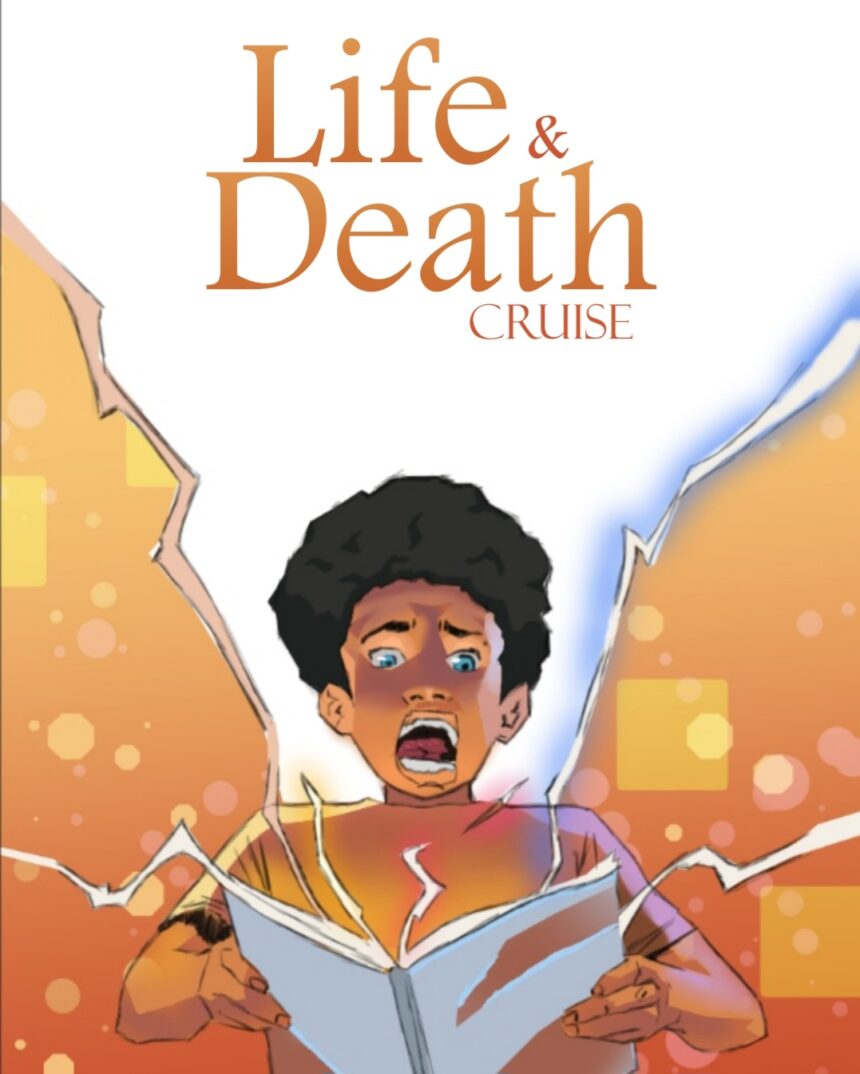Reading is aging gracefully, at least not on social media.
There’s something refreshingly chaotic, audacious, and unfiltered about Life and Death Cruise, another poetry collection by Palmwine Sounds. From the very first lines, the book barrels forward like a Lagos danfo bus with no brakes swerving between laughter and lament, weed smoke and worship, street slang and spiritual wisdom. This isn’t poetry written for the literary elite or MFA syllabi. It’s poetry made for the streets, by the streets, and of the streets. There is a cartoonish connotation to the whole set up to drive the imagery and message into your mind.
More mixtape than manuscript, Life and Death Cruise doesn’t follow traditional literary structures. Instead, it flows like a highlife album on repeat, each page humming with rhythm, riddled with local lingo, and grounded in lived experience.
It’s as much a reflection of Nigeria’s restless youth culture as it is a raw spiritual document. Through its 60 poems, Palmwine Sounds taps into a modern Afro-diasporic identity: loud, proud, confused, meditative, broken, but always dancing.
What’s this collection on about?
In today’s Nigerian pop culture, cruise has been adopted from just a slang to a lifestyle, a coping mechanism, a protest strategy. Palmwine Sounds elevates it to a spiritual plane. In the poem “Cruise,” we are told to: “Just pray and smile problems away.” It’s deceptively simple, but behind that line is a whole theology, one built not on denial but on defiance. Life’s hardships may be real, but you can mock them. You can out-dance them.
The poet reclaims joy not as a luxury, but as a weapon. Downpression (a Rasta-inflected term for oppression) is everywhere, and yet, the speaker invites us to laugh. To roll up. To dance. To catch cruise. This is the brilliance of the book—it offers pleasure as politics, humor as healing.
This is not the voice of one person, it is the voice of a generation. We hear from “Idan,” the mysterious spiritual man who goes where he pleases. “Baddo,” the godfather of street credibility. “Odogwu,” the reluctant hero. Each of these names, familiar in Nigerian slang, becomes a poetic archetype. They don’t just entertain; they teach, mock, resist, and survive.
In poems like “Men of Culture” and “Fishermen,” Palmwine Sounds doesn’t flinch from gender stereotypes. Women are ogled, celebrated, and sometimes reduced. But even in its hyper-masculine moments, the text doesn’t pretend to be morally clean. It reflects what’s real, not what’s acceptable. The poet is not out to sanitize street culture, he’s documenting it, warts and all.
Rastafari Meets Street Vernacular
Jah is everywhere in this book. Not just as a deity but as a driver, literally. “Let Jah steer the wheel,” the poet says in one moment of spiritual surrender. There is a constant interplay between Rastafarianism, Christianity, and African traditional spirituality. The divine here is not locked in a church or temple. He’s on the road. On the weed farm. In the smoke. In the rhythm.
This interweaving of the sacred and the secular gives the poems a transcendental tone. Even when speaking about marijuana, yansh (buttocks), or “ashawo” (sex workers), the speaker never fully leaves the spiritual realm. Instead, he’s drawing the divine into the messiness of modern life. God, like the poet, cruises through chaos.
What’s perhaps most striking about Life and Death Cruise is its emotional range. One minute, you’re laughing out loud at “Yansh is my Religion,” with its holy-tongue-in-cheek antics. The next, you’re sitting with “Being a Man,” a sobering meditation on masculine vulnerability: “Women can never truly understand / Battling the world and its virtues daily.”
It’s in these moments of emotional contradiction that the book shines. Palmwine Sounds understands that joy and suffering are not opposites; they are twins. You can laugh through pain. You can light up in the face of heartbreak. You can dance through death.
Beneath the streetwise humor and dancehall rhythm, Life and Death Cruise is deeply political. Not in the policy-wonk sense, but in how it confronts inequality, mental health, poverty, and spiritual disillusionment. “Cruise Nation,” for example, captures the absurdity of Nigerian democracy: “Light, water, road, no dey / Tribal discrimination / Religious discrimination.” Yet, even in this dysfunction, the poet finds something worth salvaging.
Cruise, once again, becomes the glue holding everything together. The poet is offering survival strategies as well in a country where survival itself feels like a political act. That is no small thing.
Stylistically, the book rejects the polished perfection of Western poetic tradition. Lines are short, broken, spontaneous. Some read like tweets, others like chants, some like stoned wisdom. The language is deeply rooted in Nigerian Pidgin, Afro-Caribbean patois, and Rastafarian slang. But rather than exclude readers, this language invites them in like a party where you don’t understand every lyric, but you can still move your body.
There’s a music to these pages, an unmistakable bassline. You can almost hear the drums behind the lines. This isn’t poetry you read silently. It begs to be performed, shouted, chanted, smoked to, even wept over.
The Contradictions of Masculinity and Power
In poems like “Knackademos” and “Ashawo,” the book dives headfirst into male sexuality with a mix of humor and honesty. Some might accuse it of objectification and they wouldn’t be wrong. But again, the poet never claims moral high ground. Instead, he reveals the mind of the contemporary African man in full, confused, carnal, God-fearing, horny, and occasionally holy.
“Beauty,” “Father,” and “Pain” then pivot toward tenderness, revealing another layer of masculinity, one capable of nurturing, reflecting, and hurting. The contradictions are not resolved, but presented. And in this messiness lies the book’s emotional truth.
Perhaps the most revolutionary thing Life and Death Cruise does is collapse the boundary between the sacred and profane. One page praises Jah; the next, praises Ikebe. Haha. One poem is a prayer; another, a protest. But isn’t that how real life is?
There’s a spiritual anarchy here, a refusal to separate Sunday worship from Saturday sin. The poet doesn’t strive for spiritual perfection. He strives for spiritual honesty. He doesn’t pretend to be pure. Instead, he says: this is who I am. Take it or cruise on.
This collection in its texture, understands the rhythm of Lagos, the wisdom of reggae, the madness of Twitter, the spirituality of a mountain shrine, and the laughter echoing from beer parlors at night.
Yet, it speaks to something universal: the desperate human need to find meaning, joy, and God in the middle of broken systems. It speaks to the fragility of manhood, the mystery of life, the inevitability of death and how music, humor, and herb might just be enough to survive it all.
Life and Death Cruise isn’t for everyone. If you’re expecting polished metaphors and neatly wrapped themes, look elsewhere. But if you’re looking for a book that pulses with life, dances with death, and speaks the language of now, this is it.
Palmwine Sounds has crafted a poetic manifesto for the Afro-spiritual, weed-smoking, vibe-chasing, truth-seeking generation. It’s loud, unruly, occasionally offensive, and beautifully human.
It’s a pulsating read, don’t tell anyone…yet.
– Article by Rolawe D.F







